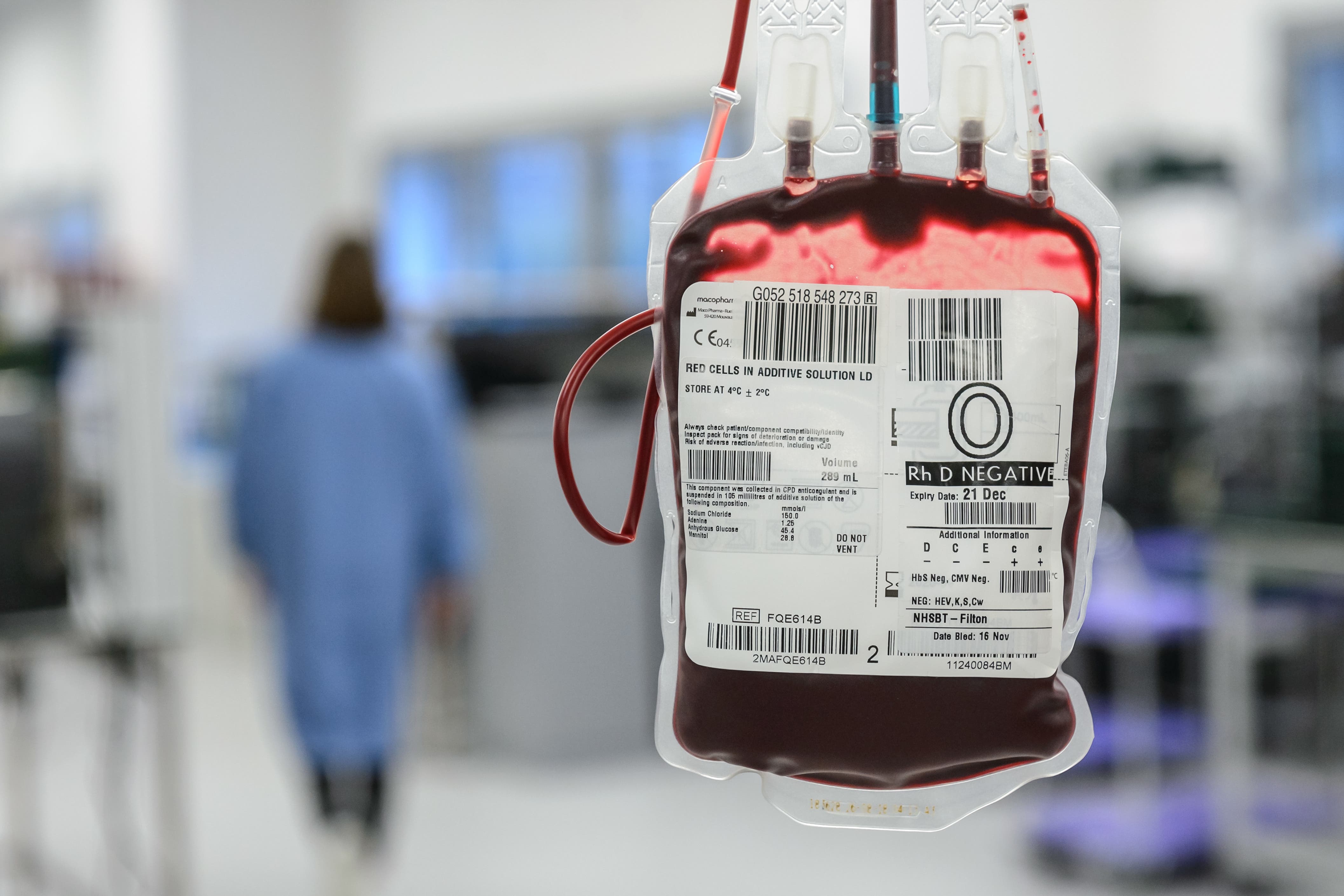NHS issues national alert over blood shortages for just second time ever
National stocks of O negative and O positive blood have fallen to ‘unprecedentedly low levels’, NHS Blood and Transplant said.

Your support helps us to tell the story
From reproductive rights to climate change to Big Tech, The Independent is on the ground when the story is developing. Whether it's investigating the financials of Elon Musk's pro-Trump PAC or producing our latest documentary, 'The A Word', which shines a light on the American women fighting for reproductive rights, we know how important it is to parse out the facts from the messaging.
At such a critical moment in US history, we need reporters on the ground. Your donation allows us to keep sending journalists to speak to both sides of the story.
The Independent is trusted by Americans across the entire political spectrum. And unlike many other quality news outlets, we choose not to lock Americans out of our reporting and analysis with paywalls. We believe quality journalism should be available to everyone, paid for by those who can afford it.
Your support makes all the difference.The NHS has made an urgent appeal for more blood donors after it issued a national alert over shortages of certain blood types.
National stocks of O negative and O positive blood have fallen to “unprecedentedly low levels” after increased demand from hospitals and high levels of unfilled appointments at donor centres created “a perfect storm”, NHS Blood and Transplant (NHSBT) said.
It is just the second time such an alert has been issued, with the only other occasion coming in October 2022.
NHSBT wrote to hospitals on Thursday to issue an “amber alert”, asking them to restrict the use of O type blood to essential cases and use substitutions where possible.
We urgently need more O group donors to come forward and help boost stocks to treat patients needing treatment
The alert is triggered when blood levels fall under two days’ worth of stock, with stocks of O negative, the universal blood group, currently at 1.6 days while overall national stocks of all blood types is 4.3 days.
It allows hospitals to implement their emergency measures to minimise usage, move staff to laboratories to vet the use of all O type blood and use patient blood management systems to minimise use of O type blood.
Donors of O negative and O positive have been asked to book and fill appointments at either the NHSBT’s 25 permanent donor centres across England or 235 mobile teams collecting blood at community venues weekly, with 45,000 appointments still available to fill between now and September.
O negative, which makes up around 16% of hospital orders, is used in emergencies or when a patient’s blood type is unknown, with air ambulances and emergency response vehicles carrying supplies of the blood type.
NHSBT said the ongoing cyber incident which affected several London hospitals last month had also impacted O negative stocks, with a 94% increase in demand compared with the same period last year.
Several hospitals, including King’s College Hospital, Guy’s and St Thomas’, declared a critical incident, cancelled operations and tests and were unable to carry out blood transfusions after the attack on the pathology firm Synnovis.
NHSBT chief executive Dr Jo Farrar said: “We urgently need more O group donors to come forward and help boost stocks to treat patients needing treatment.
“Last month we saw an incredible response from donors who answered our call and filled up our centres, helping us meet the increased demands for blood throughout June.
“However, seven weeks on, the need for O negative blood in particular remains critical.”
Dr Farrar said the health authority was making an additional 1,000 appointments available each week.
Comedian Dara O’Briain joined the appeal as he said in a post shared on X, formerly Twitter: “Do you have blood type o negative? Stocks are really, really short at the moment, so NHSBT would love to you to arrange to give blood as soon as you can!
“I recommend the centre in Westfield, excellent chocolate biscuits afterwards. Other blood types gratefully accepted too!”
There are just under 800,000 regular blood donors nationally but blood has a shelf life of only 35 days, NHSBT’s chief medical officer Dr Gail Miflin said.
Women can donate once every four months, while men can donate once every three months.
The NHS needs to collect 1.45 million units of blood and have up to 200,000 new blood donors each year to replace those who stop donating and to ensure the right mix of blood groups for future patients’ needs.
To book an appointment to give blood, call 0300 123 23 23 or visit www.blood.co.uk.